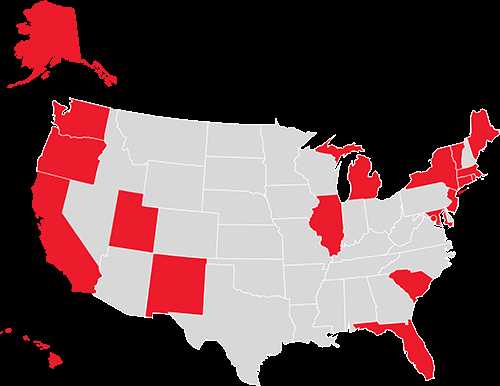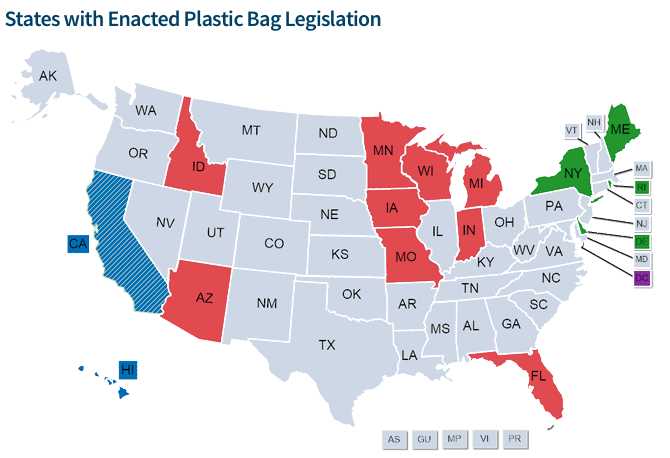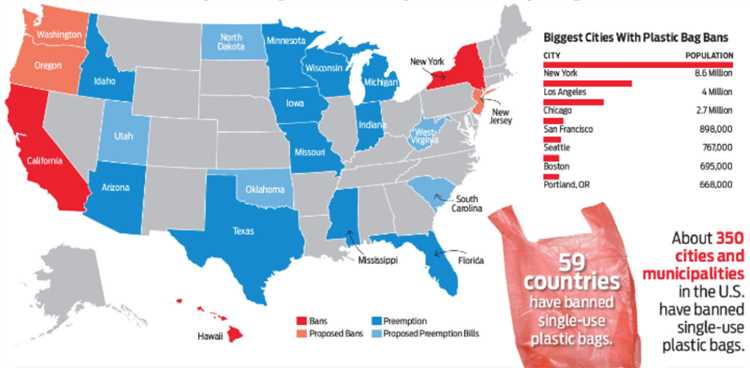
In an effort to reduce plastic waste and promote sustainability, many states in the U.S. have implemented policies that charge consumers for using plastic bags. These policies aim to encourage individuals to use reusable bags instead, which can help protect the environment and conserve resources. In recent years, the number of states adopting such measures has been growing, with more and more jurisdictions realizing the benefits of reducing plastic bag usage.
One state that charges for plastic bags is California. In 2014, California became the first state in the U.S. to pass a statewide ban on single-use plastic bags at large retail stores. The law, which was later expanded to include smaller stores as well, requires retailers to charge a minimum of $0.10 for each recycled paper bag or reusable bag provided to customers. This initiative has been successful in significantly reducing plastic bag consumption in the state.
Another state that has implemented similar policies is New York. In 2019, New York passed legislation that introduced a statewide ban on single-use plastic bags. The law, which went into effect in March 2020, requires retailers to charge a $0.05 fee for every paper bag provided to customers. The aim of this policy is to encourage people to bring their own reusable bags when shopping and to ultimately reduce plastic waste.
Other states that have implemented bag fees or bans include Connecticut, Hawaii, Maine, Oregon, and Vermont, among others. Each state has its own specific regulations and fees, but the underlying goal remains the same – to encourage a shift towards more sustainable practices and reduce the negative environmental impact of plastic bags.
By charging for plastic bags, these states are not only raising awareness about the environmental consequences of plastic waste, but also providing a financial incentive for individuals to choose more sustainable alternatives. These efforts are part of a larger global movement towards reducing plastic waste and creating a more sustainable future for generations to come.
- California – First State to Implement Charge on Plastic Bags
- Background
- Implementation
- Impact
- New York – Plastic Bag Ban and Fee Implementation
- Plastic Bag Ban
- Fee for Paper Bags
- Exemptions
- Impact
- Connecticut – Reducing Plastic Bag Waste Through a Fee
- The Background
- How It Works
- Hawaii – Plastic Bag Prohibition and Recyclable Materials Fee
- Maine – Transitioning to a Plastic-Free Future with a Bag Fee
- Positive Impacts of the Bag Fee
- The Future of Plastic in Maine
- Oregon – Taking Action to Combat Plastic Pollution with Bag Fees
- Benefits of Bag Fees
- Positive Impact on the Environment
- Q&A,
- Which states charge for plastic bags?
- Why do some states charge for plastic bags?
- What is the purpose of charging for plastic bags?
- How much do states charge for plastic bags?
- Are there any exemptions or discounts for charging plastic bags?
California – First State to Implement Charge on Plastic Bags
California became the first state in the United States to implement a charge on plastic bags in 2014. The decision came after years of debate and lobbying by environmental groups and supporters of sustainable living.
The charge on plastic bags was introduced as part of California’s efforts to reduce the negative impact of single-use plastic on the environment. It aimed to encourage the use of reusable bags and provide an economic incentive for consumers to change their behavior.
Background
California has long been at the forefront of environmental legislation and has been a pioneer in implementing measures to reduce plastic waste. The state has historically faced significant challenges related to plastic pollution and its impact on wildlife and ecosystems.
After years of research, public awareness campaigns, and policy discussions, California took a bold step by implementing a statewide charge on plastic bags. The aim was to reduce reliance on disposable bags and encourage the use of more sustainable alternatives.
Implementation
The charge on plastic bags in California applies to all retail establishments, including grocery stores, supermarkets, and other retail stores. Customers are required to pay a small fee for each single-use plastic bag they use.
Initially, the charge started at $0.10 per bag, but it has since been increased to $0.25 per bag. The revenue generated from the charge goes back to the stores to support their efforts in implementing and promoting sustainable practices.
The implementation of the charge was met with some resistance from certain sectors, including plastic bag manufacturers and some consumers. However, the majority of Californians have embraced the change and have adapted their shopping habits accordingly.
Impact

The charge on plastic bags in California has had a significant impact on reducing plastic waste and promoting sustainable practices. According to reports, the use of single-use plastic bags has dropped by more than 70% since the implementation of the charge.
Furthermore, many consumers have made a shift towards using reusable bags, which has contributed to a decrease in plastic bag litter and marine pollution. The charge has also served as a valuable source of revenue for stores, which can further invest in sustainable initiatives.
California’s success in implementing a charge on plastic bags has served as a model for other states and countries considering similar measures. It has demonstrated that even small fees can make a significant difference in reducing plastic waste and promoting a more sustainable future.
New York – Plastic Bag Ban and Fee Implementation
New York is one of the states that has implemented a plastic bag ban and fee to reduce the use of single-use plastic bags. The ban and fee were put into effect on March 1, 2020.
Plastic Bag Ban
The plastic bag ban in New York prohibits the distribution of most single-use plastic bags at retail establishments, including grocery stores, supermarkets, and pharmacies. This ban aims to encourage consumers to bring their own reusable bags when shopping.
Fee for Paper Bags
As part of the ban, New York also implemented a fee for paper bags provided by retailers. Customers who do not bring their own reusable bags are charged a fee for each paper bag they use at checkout. The fee varies depending on the county but generally ranges from 5 cents to 10 cents per bag. The purpose of this fee is to incentivize consumers to use reusable bags instead of relying on paper bags.
Exemptions
There are certain exemptions to the plastic bag ban in New York. Some types of plastic bags are still allowed, such as those used to package bulk items, fruits and vegetables, and prescription medications. Additionally, plastic bags used for takeout food and bags provided by certain exempt businesses, such as restaurants and delis, are also not subject to the ban.
Impact
Since the implementation of the plastic bag ban and fee in New York, there has been a noticeable reduction in the use of single-use plastic bags. Consumers have started to adopt reusable bags more frequently, leading to a decrease in plastic waste and litter. This shift in behavior is contributing to a more sustainable and environmentally-friendly future.
Connecticut – Reducing Plastic Bag Waste Through a Fee
Connecticut is playing its part in reducing plastic bag waste by implementing a fee on single-use plastic bags. This initiative aims to encourage residents to bring their reusable bags when shopping, thereby reducing the amount of plastic waste generated in the state.
The Background
Connecticut’s efforts to tackle plastic bag waste started in 2019 when the state’s legislature passed a law to charge a fee on single-use plastic bags. The law was implemented as a way to reduce the environmental impact of plastic bags, which often end up in landfills or as litter in the state’s parks, rivers, and oceans.
How It Works
Under Connecticut’s plastic bag fee law, retailers are required to charge a fee of $0.10 per single-use plastic bag provided to customers at the checkout. This fee applies to most retail establishments, including grocery stores, convenience stores, and department stores.
The fee is intended to incentivize residents to bring their own reusable bags when shopping. By charging for single-use plastic bags, Connecticut hopes to shift consumer behavior towards more sustainable and environmentally friendly alternatives.
There are some exceptions to the fee. Certain items, such as meat, seafood, and prescription drugs, are exempt from the fee as they require separate packaging for hygiene and safety reasons. Additionally, customers using federal nutrition benefits like the Supplemental Nutrition Assistance Program (SNAP) are also exempt from the fee.
The revenue generated from the plastic bag fee goes to the state’s Department of Revenue Services and is used for environmental purposes, including recycling programs, litter cleanup, and education campaigns.
Connecticut’s plastic bag fee has been successful in reducing plastic bag usage in the state. Since its implementation, there has been a noticeable decline in the number of single-use plastic bags being used, leading to a reduction in plastic bag waste.
Other states have looked to Connecticut as an example and have implemented similar fees to tackle plastic bag waste. The success of Connecticut’s initiative serves as a testament to the effectiveness of charging for plastic bags in reducing environmental impact.
Hawaii – Plastic Bag Prohibition and Recyclable Materials Fee
In an effort to reduce plastic waste and promote the use of reusable bags, Hawaii implemented a plastic bag prohibition in 2015. This means that retailers are no longer allowed to give out single-use plastic bags to customers.
Instead, customers are encouraged to bring their own reusable bags or purchase them from the store. Retailers are required to provide recyclable paper bags or reusable bags for a fee. This fee serves as an incentive for customers to bring their own bags and reduce their reliance on single-use plastics.
Hawaii’s plastic bag prohibition applies to all retailers, including grocery stores, retail shops, and restaurants. The goal is to significantly reduce the amount of plastic waste that ends up in landfills and the environment.
The recyclable materials fee charged by retailers varies, but it is typically around 10 to 15 cents per bag. This fee helps to cover the cost of providing recyclable or reusable bags to customers and encourages a shift towards more sustainable practices.
Since the implementation of the plastic bag prohibition, Hawaii has seen a significant decrease in plastic bag usage and an increase in the use of reusable bags. This has had a positive impact on the environment by reducing plastic pollution and promoting a more sustainable lifestyle.
The plastic bag prohibition and recyclable materials fee in Hawaii serve as a model for other states and countries to follow in order to reduce plastic waste and promote the use of reusable bags. By implementing similar measures, we can all contribute to a cleaner and healthier planet.
Maine – Transitioning to a Plastic-Free Future with a Bag Fee
The state of Maine has taken significant steps towards reducing plastic waste by implementing a bag fee. The goal behind this initiative is to encourage consumers to use reusable bags and, ultimately, to create a plastic-free future.
Starting July 1, 2021, retailers in Maine are required to charge a fee of $0.05 for each single-use plastic bag provided at checkout. This fee applies to most businesses, including grocery stores, convenience stores, and retail stores. However, certain exempt businesses such as restaurants, pharmacies, and farmers’ markets are not subject to this rule.
The bag fee is meant to make consumers think twice before opting for single-use plastic bags. By imposing a small charge, it encourages people to bring their own reusable bags or choose paper bags instead. The collected fees will be used to fund recycling and education programs, further promoting sustainable practices.
Positive Impacts of the Bag Fee
The introduction of the bag fee in Maine has already shown positive impacts on reducing plastic bag consumption. According to initial reports, there has been a significant decrease in the number of plastic bags used by consumers across the state. This reduction is a crucial step in protecting the environment and marine life from the harmful effects of plastic pollution.
The bag fee has also encouraged the usage of reusable bags among Maine residents. Many individuals are now more conscious of their shopping habits and have made the switch to reusable bags, which are more durable and environmentally friendly. Reusable bags help to minimize waste and conserve resources, making them a sustainable alternative to single-use plastic bags.
The Future of Plastic in Maine

Maine’s bag fee is just the beginning of a larger effort to transition to a plastic-free future. The state is committed to promoting sustainable practices and finding innovative solutions to reduce plastic waste. By adopting policies like the bag fee, Maine hopes to inspire other states and regions to take similar actions towards creating a cleaner and greener environment.
In conclusion, Maine’s bag fee is an important step towards reducing plastic waste and promoting sustainable habits. By implementing this fee, the state is encouraging consumers to choose reusable bags over single-use plastic ones, thereby minimizing the negative impacts of plastic pollution. The bag fee not only brings immediate positive changes to the environment but also sets an example for other communities to follow in the fight against plastic waste.
Oregon – Taking Action to Combat Plastic Pollution with Bag Fees
Oregon is one of the states in the United States that has taken a proactive approach to combat plastic pollution by implementing bag fees. The introduction of bag fees has been a significant step towards reducing the usage of single-use plastic bags and encouraging environmentally-friendly alternatives.
Bag Fees in Oregon
Oregon has implemented bag fees in certain cities and counties, aiming to discourage the usage of disposable plastic bags. The fees typically range from five to ten cents per bag and apply to both grocery and retail stores. The revenue generated from these bag fees is often used to fund environmental initiatives and programs dedicated to tackling plastic pollution.
Benefits of Bag Fees
Bag fees have proven to be an effective measure in reducing plastic bag consumption and encouraging people to bring reusable bags. By implementing bag fees, Oregon is encouraging individuals to make more sustainable choices and actively participate in preserving the environment.
Moreover, bag fees have the additional benefit of raising awareness about the negative environmental impacts of plastic bags. They serve as a reminder of the larger plastic pollution problem and the importance of finding alternatives to single-use plastics.
Positive Impact on the Environment
Since the implementation of bag fees, Oregon has experienced a significant reduction in the usage of disposable plastic bags. This reduction has resulted in a decrease in plastic waste and litter, ultimately contributing to cleaner streets, parks, and waterways.
Furthermore, bag fees have encouraged individuals to adopt reusable bags, which significantly reduces the need for plastic bag production. This, in turn, helps conserve energy and reduce greenhouse gas emissions associated with plastic bag manufacturing.
Oregon’s commitment to combating plastic pollution through the implementation of bag fees demonstrates their dedication to environmental preservation. By reducing the use of plastic bags, Oregon is setting an example for other states and countries to follow, promoting a more sustainable future for all.
Q&A,
Which states charge for plastic bags?
There are several states in the United States that charge for plastic bags, including California, New York, Connecticut, Hawaii, and Vermont.
Why do some states charge for plastic bags?
These states charge for plastic bags as part of their efforts to reduce plastic waste and promote environmental conservation. By implementing a fee for plastic bags, they aim to encourage people to use reusable bags and reduce their reliance on single-use plastics.
What is the purpose of charging for plastic bags?
The purpose of charging for plastic bags is twofold. Firstly, it aims to reduce the consumption of single-use plastics and encourage individuals to switch to reusable alternatives. Secondly, it provides an additional source of revenue for the state governments, which can be used for environmental initiatives or other public projects.
How much do states charge for plastic bags?
The fee for plastic bags varies from state to state. In California, for example, the charge is typically around $0.10 per bag. In New York, it is $0.05 per bag. The exact amount can also depend on the type of store and the size of the bag.
Are there any exemptions or discounts for charging plastic bags?
Yes, some states have exemptions or discounts for charging plastic bags. For example, in California, recipients of public assistance programs can receive free bags. Additionally, some states may exempt certain types of bags, such as those used for produce or medication, from the fee.